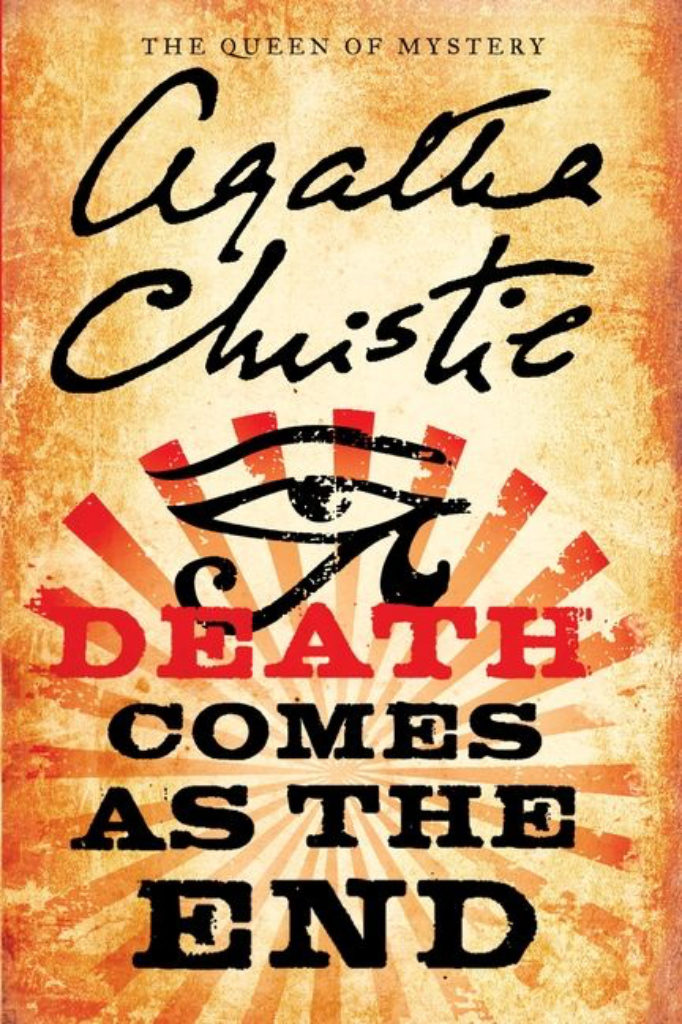Death Comes as the End by Agatha Christie has been reviewed by Focus on the Family’s marriage and parenting magazine.

Death Comes as the End by Agatha Christie has been reviewed by Focus on the Family’s marriage and parenting magazine.
In ancient Egypt, newly widowed Renisenb returns home to live with her family. Her father, Imhotep, is a wealthy and arrogant mortuary priest. Yahmose, Sobek and the much younger Ipy are her three brothers.
Yahmose is the obedient, soft-spoken older son, who often receives criticism from his boisterous wife, Satipy, for his lack of nerve. Sobek, married to Kait, is more hot-headed. The family also includes Esa (Imhotep’s mother), Teti (Renisenb’s young daughter) and Yahmose and Sobek’s children. Henet, a female servant who cajoles Imhotep, and Hori, the long-time family scribe, also live in the household.
Renisenb knows her family members sometimes quarrel. Imhotep expects a lot from his sons, and the men argue about who should manage various tasks. The tone of the household changes dramatically for the worse when Imhotep returns from a voyage north with a young, beautiful concubine named Nofret. He also brings a handsome scribe named Kameni.
Everyone realizes Nofret stands to inherit Imhotep’s fortune. They dislike her not only for this reason, but because she is mean and spiteful. She tells Imhotep what to do and wheedles things for herself from him. She criticizes and mocks the others.
Esa urges Imhotep to take Nofret with him when he’s called back to the north on business. She fears the girl will be miserable in a place where everyone hates her. Imhotep invites her to go, but she refuses. He asks Henet to watch over Nofret and send him word if anyone should mistreat her in his absence.
Renisenb makes an effort to be friendly to Nofret, but even she is met with cruelty. Nofret soon decides she is being disrespected, and Henet has Kameni write a letter, which is sent to Imhotep. Various members of the family express their feelings about the concubine. Before Imhotep can return, Nofret is found dead. Someone has pushed her from a cliff.
Before much time has passed, Satipy plummets to her death from the same cliff while walking with Yahmose. Witnesses see her looking off in terror before the fall, and everyone begins to believe Nofret’s spirit is haunting the family. Next, Yahmose and Sobek are poisoned. Sobek dies, and Yahmose slowly recovers.
Kind-hearted, innocent Renisenb tries to make sense of these strange events. She talks through her concerns and feelings with Esa and Hori. Meanwhile, Kameni sings songs of love to woo her. Imhotep goes from being angry to distraught. Henet continues to pander to him, while secretly warning and threatening Renisenb.
The drowned body of the pompous Ipy is found next. Esa carefully monitors the food supply to ensure no more poisoning will take place. Despite her best efforts to keep everyone safe, she is poisoned topically when someone tampers with her skin ointment.
Imhotep decides he must make preparations for the worst, since only a few family members remain. He consults with priests and makes offerings to Renisenb’s dead mother, asking her to prevent Nofret’s spirit from causing anymore harm to the family. He also decides Renisenb must marry at once, in case he and Yahmose die. If the estate fell to her, there would be many things a woman would not be permitted to manage.
Renisenb is given a choice between Kameni and Hori for a husband. She is attracted to Kameni because he reminds her of her dead husband, and life with him would be easy. But Hori, an older family fixture, opens her mind to new ideas. Renisenb discovers Nofret wouldn’t leave with Imhotep on his journeys because she was in love with Kameni. He didn’t return her feelings.
Renisenb is told Hori wants to meet her on the path where Nofret and Satipy died. She discovered she was actually summoned by Yahmose, who now intends to kill her like he did the others. Hori kills Yahmose and saves Renisenb just in time. She chooses to marry Hori.
None
Characters frequently worship, call upon, compare and swear by various Egyptian gods. They claim evil magic is at work around them and that Nofret brought it into their lives. Renisenb’s family believes her mother and husband abide in the kingdom of the dead. Hori says Egyptians have no real belief in various gods; people simply see them as men and women who do what real men and women can’t. Imhotep makes offerings through a priest, asking his dead first wife to keep Nofret from causing anymore harm to their family.
Strong-willed, pompous Imhotep feels he has the right to “live as a man” and take a concubine, despite his family’s objections. As family members begin to die, he falls back on the hope that his dead wife can protect the family from evil. Esa, the wise and astute matriarch, tries to help Renisenb and Hori reason through the murders and protect the family from further losses.
Many people are murdered, and broken, cold, twisted bodies are found in the aftermath.
Sobek reportedly spends time with women other than his wife, including dancing girls.
Get free discussion questions for this book and others, at FocusOnTheFamily.com/discuss-books.
You can request a review of a title you can’t find at reviewrequests@family.org.
Book reviews cover the content, themes and worldviews of fiction books, not their literary merit, and equip parents to decide whether a book is appropriate for their children. The inclusion of a book’s review does not constitute an endorsement by Focus on the Family.